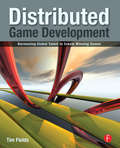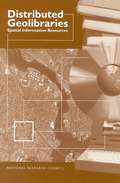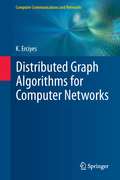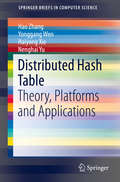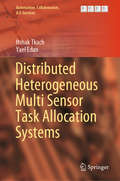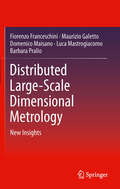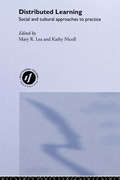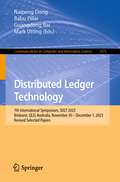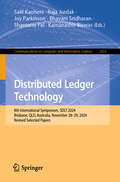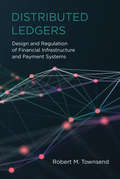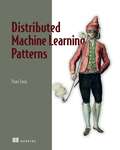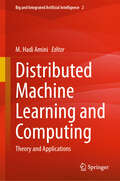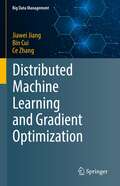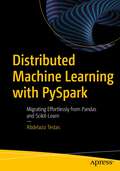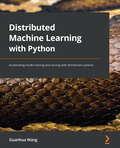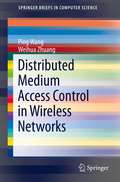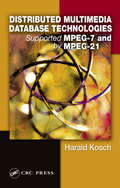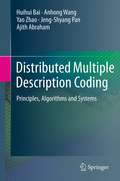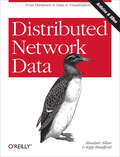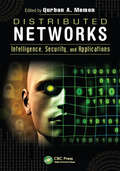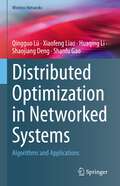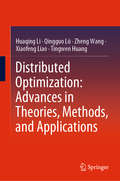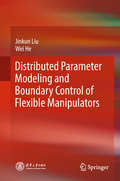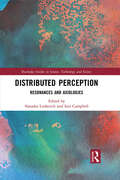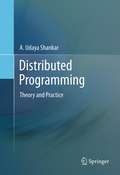- Table View
- List View
Distributed Game Development: Harnessing Global Talent to Create Winning Games
by Tim FieldsTake control of your global game development team and make successful AAA game titles using the 'Distributed Development' model. Game industry veteran Tim Fields teaches you how to evaluate game deals, how to staff teams for highly distributed game development, and how to maintain challenging relationships in order to get great games to market. This book is filled with interviews with a broad spectrum of industry experts from top game publishers and business owners in the US and UK. A supplementary web site provides interviews from the book, a forum where developers and publishers can connect, and additional tips and tricks. Topics include:
Distributed Geolibraries: Spatial Information Resources Summary of a Workshop
by National Research CouncilPresents the findings of the Workshop on Distributed Geolibraries: Spatial Information Resources, convened by the Mapping Science Committee of the National Research Council in June 1998
Distributed Graph Algorithms for Computer Networks
by K. ErciyesThis book presents a comprehensive review of key distributed graph algorithms for computer network applications, with a particular emphasis on practical implementation. Topics and features: introduces a range of fundamental graph algorithms, covering spanning trees, graph traversal algorithms, routing algorithms, and self-stabilization; reviews graph-theoretical distributed approximation algorithms with applications in ad hoc wireless networks; describes in detail the implementation of each algorithm, with extensive use of supporting examples, and discusses their concrete network applications; examines key graph-theoretical algorithm concepts, such as dominating sets, and parameters for mobility and energy levels of nodes in wireless ad hoc networks, and provides a contemporary survey of each topic; presents a simple simulator, developed to run distributed algorithms; provides practical exercises at the end of each chapter.
Distributed Hash Table
by Hao Zhang Yonggang Wen Haiyong Xie Nenghai YuThis SpringerBrief summarizes the development of Distributed Hash Table in both academic and industrial fields. It covers the main theory, platforms and applications of this key part in distributed systems and applications, especially in large-scale distributed environments. The authors teach the principles of several popular DHT platforms that can solve practical problems such as load balance, multiple replicas, consistency and latency. They also propose DHT-based applications including multicast, anycast, distributed file systems, search, storage, content delivery network, file sharing and communication. These platforms and applications are used in both academic and commercials fields, making Distributed Hash Table a valuable resource for researchers and industry professionals.
Distributed Heterogeneous Multi Sensor Task Allocation Systems (Automation, Collaboration, & E-Services #7)
by Itshak Tkach Yael EdanToday’s real-world problems and applications in sensory systems and target detection require efficient, comprehensive and fault-tolerant multi-sensor allocation. This book presents the theory and applications of novel methods developed for such sophisticated systems. It discusses the advances in multi-agent systems and AI along with collaborative control theory and tools. Further, it examines the formulation and development of an allocation framework for heterogeneous multi-sensor systems for various real-world problems that require sensors with different performances to allocate multiple tasks, with unknown a priori priorities that arrive at unknown locations at unknown time. It demonstrates how to decide which sensor to allocate to which tasks when and where. Lastly, it explains the reliability and availability issues of task allocation systems, and includes methods for their optimization.The presented methods are explained, measured, and evaluated by extensive simulations, and the results of these simulations are presented in this book. This book is an ideal resource for academics, researchers and graduate students as well as engineers and professionals and is relevant for various applications such as sensor network design, multi-agent systems, task allocation, target detection, and team formation.
Distributed Large-Scale Dimensional Metrology
by Domenico Maisano Fiorenzo Franceschini Luca Mastrogiacomo Barbara Pralio Maurizio GalettoThe field of large-scale dimensional metrology (LSM) deals with objects that have linear dimensions ranging from tens to hundreds of meters. It has recently attracted a great deal of interest in many areas of production, including the automotive, railway, and shipbuilding sectors. Distributed Large-Scale Dimensional Metrology introduces a new paradigm in this field that reverses the classical metrological approach: measuring systems that are portable and can be easily moved around the location of the measured object, which is preferable to moving the object itself. Distributed Large-Scale Dimensional Metrology combines the concepts of distributed systems and large scale metrology at the application level. It focuses on the latest insights and challenges of this new generation of systems from the perspective of the designers and developers. The main topics are: coverage of measuring area,sensors calibration,on-line diagnostics,probe management, andanalysis of metrological performance.The general descriptions of each topic are further enriched by specific examples concerning the use of commercially available systems or the development of new prototypes. This will be particularly useful for professional practitioners such as quality engineers, manufacturing and development engineers, and procurement specialists, but Distributed Large-Scale Dimensional Metrology also has a wealth of information for interested academics.
Distributed Learning: Social and Cultural Approaches to Practice
by Mary R. Lea Kathy NicollAt a time of increasing globalisation, the concept of open and distance learning is being constantly redefined. New technologies have opened up new ways of understanding and participating in Learning. Distributed Learning offers a collection of perspectives from a social and cultural practice-based viewpoint, with contributions from leading international authors in the field. Key issues in this comprehensive text are:*the challenges of ICT to traditional teaching and learning practices*the value and relevance of 'activity theory' and 'communities of practice' in educational institutions and the workplace*perspectives on the relationship between globalisation and distributed learning, and the breakdown of distinctions between global and local contexts*issues of identity and community in designing courses for the virtual student*language and literacies in distributed learning contextsThis book provides useful introductory reading, building a sound theoretical framework for practitioners interested in how distributed learning is shaping post-compulsory education.
Distributed Ledger Technology: 7th International Symposium, SDLT 2023, Brisbane, QLD, Australia, November 30 – December 1, 2023, Revised Selected Papers (Communications in Computer and Information Science #1975)
by Mark Utting Guangdong Bai Naipeng Dong Babu PillaiThis book constitutes the proceedings of the 7th International Symposium, SDLT 2023, held in Brisbane, QLD, Australia, during November 30 – December 1, 2023.The 8 full papers and the short paper included in this volume were carefully reviewed and selected from 32 submissions. The volume focuses on current systems and new solutions to create a scientific background for a solid development of innovative Distributed Ledger Technology application.
Distributed Ledger Technology: 8th International Symposium, SDLT 2024, Brisbane, QLD, Australia, November 28–29, 2024, Revised Selected Papers (Communications in Computer and Information Science #2453)
by Salil Kanhere Raja Jurdak Shantanu Pal Joy Parkinson Bhavani Sridharan Kamanashis BiswasThis book constitutes the refereed proceedings of the 8th International Symposium on Distributed Ledger Technology, SDLT 2024, held in Brisbane, QLD, Australia, during November 28–29, 2024. The 8 full papers and 1 short paper included in this book were carefully reviewed and selected from 31 submissions. They deal with current systems and innovative solutions providing a robust scientific foundation for the advancement of Distributed Ledger Technology applications.
Distributed Ledgers: Design and Regulation of Financial Infrastructure and Payment Systems
by Robert M. TownsendAn economic analysis of what distributed ledgers can do, examining key components and discussing applications in both developed and emerging market economies.Distributed ledger technology (DLT) has the potential to transform economic organization and financial structure. In this book, Robert Townsend steps back from the hype and controversy surrounding DLT (and the related, but not synonymous, innovations of blockchain and Bitcoin) to offer an economic analysis of what distributed ledgers can do. Townsend examines the key components of distributed ledgers, discussing, evaluating, and illustrating each in the context of historical and contemporary economics, and reviewing featured applications in both developed economies and emerging-market countries.
Distributed Machine Learning Patterns
by Yuan TangPractical patterns for scaling machine learning from your laptop to a distributed cluster.Distributing machine learning systems allow developers to handle extremely large datasets across multiple clusters, take advantage of automation tools, and benefit from hardware accelerations. This book reveals best practice techniques and insider tips for tackling the challenges of scaling machine learning systems. In Distributed Machine Learning Patterns you will learn how to: Apply distributed systems patterns to build scalable and reliable machine learning projects Build ML pipelines with data ingestion, distributed training, model serving, and more Automate ML tasks with Kubernetes, TensorFlow, Kubeflow, and Argo Workflows Make trade-offs between different patterns and approaches Manage and monitor machine learning workloads at scale Inside Distributed Machine Learning Patterns you&’ll learn to apply established distributed systems patterns to machine learning projects—plus explore cutting-edge new patterns created specifically for machine learning. Firmly rooted in the real world, this book demonstrates how to apply patterns using examples based in TensorFlow, Kubernetes, Kubeflow, and Argo Workflows. Hands-on projects and clear, practical DevOps techniques let you easily launch, manage, and monitor cloud-native distributed machine learning pipelines. About the technology Deploying a machine learning application on a modern distributed system puts the spotlight on reliability, performance, security, and other operational concerns. In this in-depth guide, Yuan Tang, project lead of Argo and Kubeflow, shares patterns, examples, and hard-won insights on taking an ML model from a single device to a distributed cluster. About the book Distributed Machine Learning Patterns provides dozens of techniques for designing and deploying distributed machine learning systems. In it, you&’ll learn patterns for distributed model training, managing unexpected failures, and dynamic model serving. You&’ll appreciate the practical examples that accompany each pattern along with a full-scale project that implements distributed model training and inference with autoscaling on Kubernetes. What's inside Data ingestion, distributed training, model serving, and more Automating Kubernetes and TensorFlow with Kubeflow and Argo Workflows Manage and monitor workloads at scale About the reader For data analysts and engineers familiar with the basics of machine learning, Bash, Python, and Docker. About the author Yuan Tang is a project lead of Argo and Kubeflow, maintainer of TensorFlow and XGBoost, and author of numerous open source projects. Table of Contents PART 1 BASIC CONCEPTS AND BACKGROUND 1 Introduction to distributed machine learning systems PART 2 PATTERNS OF DISTRIBUTED MACHINE LEARNING SYSTEMS 2 Data ingestion patterns 3 Distributed training patterns 4 Model serving patterns 5 Workflow patterns 6 Operation patterns PART 3 BUILDING A DISTRIBUTED MACHINE LEARNING WORKFLOW 7 Project overview and system architecture 8 Overview of relevant technologies 9 A complete implementation
Distributed Machine Learning and Computing: Theory and Applications (Big and Integrated Artificial Intelligence #2)
by M. Hadi AminiThis book focuses on a wide range of distributed machine learning and computing algorithms and their applications in healthcare and engineering systems. The contributors explore how these techniques can be applied to different real-world problems. It is suitable for students and researchers interested in conducting research in multidisciplinary areas that rely on distributed machine learning and computing techniques.
Distributed Machine Learning and Gradient Optimization (Big Data Management)
by Bin Cui Ce Zhang Jiawei JiangThis book presents the state of the art in distributed machine learning algorithms that are based on gradient optimization methods. In the big data era, large-scale datasets pose enormous challenges for the existing machine learning systems. As such, implementing machine learning algorithms in a distributed environment has become a key technology, and recent research has shown gradient-based iterative optimization to be an effective solution. Focusing on methods that can speed up large-scale gradient optimization through both algorithm optimizations and careful system implementations, the book introduces three essential techniques in designing a gradient optimization algorithm to train a distributed machine learning model: parallel strategy, data compression and synchronization protocol. Written in a tutorial style, it covers a range of topics, from fundamental knowledge to a number of carefully designed algorithms and systems of distributed machine learning. It will appeal to a broad audience in the field of machine learning, artificial intelligence, big data and database management.
Distributed Machine Learning with PySpark: Migrating Effortlessly from Pandas and Scikit-Learn
by Abdelaziz TestasMigrate from pandas and scikit-learn to PySpark to handle vast amounts of data and achieve faster data processing time. This book will show you how to make this transition by adapting your skills and leveraging the similarities in syntax, functionality, and interoperability between these tools. Distributed Machine Learning with PySpark offers a roadmap to data scientists considering transitioning from small data libraries (pandas/scikit-learn) to big data processing and machine learning with PySpark. You will learn to translate Python code from pandas/scikit-learn to PySpark to preprocess large volumes of data and build, train, test, and evaluate popular machine learning algorithms such as linear and logistic regression, decision trees, random forests, support vector machines, Naïve Bayes, and neural networks. After completing this book, you will understand the foundational concepts of data preparation and machine learning and will have the skills necessary to apply these methods using PySpark, the industry standard for building scalable ML data pipelines. What You Will Learn Master the fundamentals of supervised learning, unsupervised learning, NLP, and recommender systemsUnderstand the differences between PySpark, scikit-learn, and pandasPerform linear regression, logistic regression, and decision tree regression with pandas, scikit-learn, and PySparkDistinguish between the pipelines of PySpark and scikit-learn Who This Book Is For Data scientists, data engineers, and machine learning practitioners who have some familiarity with Python, but who are new to distributed machine learning and the PySpark framework.
Distributed Machine Learning with Python: Accelerating model training and serving with distributed systems
by Guanhua WangBuild and deploy an efficient data processing pipeline for machine learning model training in an elastic, in-parallel model training or multi-tenant cluster and cloudKey FeaturesAccelerate model training and interference with order-of-magnitude time reductionLearn state-of-the-art parallel schemes for both model training and servingA detailed study of bottlenecks at distributed model training and serving stagesBook DescriptionReducing time cost in machine learning leads to a shorter waiting time for model training and a faster model updating cycle. Distributed machine learning enables machine learning practitioners to shorten model training and inference time by orders of magnitude. With the help of this practical guide, you'll be able to put your Python development knowledge to work to get up and running with the implementation of distributed machine learning, including multi-node machine learning systems, in no time. You'll begin by exploring how distributed systems work in the machine learning area and how distributed machine learning is applied to state-of-the-art deep learning models. As you advance, you'll see how to use distributed systems to enhance machine learning model training and serving speed. You'll also get to grips with applying data parallel and model parallel approaches before optimizing the in-parallel model training and serving pipeline in local clusters or cloud environments. By the end of this book, you'll have gained the knowledge and skills needed to build and deploy an efficient data processing pipeline for machine learning model training and inference in a distributed manner.What you will learnDeploy distributed model training and serving pipelinesGet to grips with the advanced features in TensorFlow and PyTorchMitigate system bottlenecks during in-parallel model training and servingDiscover the latest techniques on top of classical parallelism paradigmExplore advanced features in Megatron-LM and Mesh-TensorFlowUse state-of-the-art hardware such as NVLink, NVSwitch, and GPUsWho this book is forThis book is for data scientists, machine learning engineers, and ML practitioners in both academia and industry. A fundamental understanding of machine learning concepts and working knowledge of Python programming is assumed. Prior experience implementing ML/DL models with TensorFlow or PyTorch will be beneficial. You'll find this book useful if you are interested in using distributed systems to boost machine learning model training and serving speed.
Distributed Medium Access Control in Wireless Networks
by Ping Wang Weihua ZhuangThis brief investigates distributed medium access control (MAC) with QoS provisioning for both single- and multi-hop wireless networks including wireless local area networks (WLANs), wireless ad hoc networks, and wireless mesh networks. For WLANs, an efficient MAC scheme and a call admission control algorithm are presented to provide guaranteed QoS for voice traffic and, at the same time, increase the voice capacity significantly compared with the current WLAN standard. In addition, a novel token-based scheduling scheme is proposed to provide great flexibility and facility to the network service provider for service class management. Also proposed is a novel busy-tone based distributed MAC scheme for wireless ad hoc networks and a collision-free MAC scheme for wireless mesh networks, respectively, taking the different network characteristics into consideration. The proposed schemes enhance the QoS provisioning capability to real-time traffic and, at the same time, significantly improve the system throughput and fairness performance for data traffic, as compared with the most popular IEEE 802.11 MAC scheme.
Distributed Multimedia Database Technologies Supported by MPEG-7 and MPEG-21
by Harald KoschA multimedia system needs a mechanism to communicate with its environment, the Internet, clients, and applications. MPEG-7 provides a standard metadata format for global communication, but lacks the framework to let the various players in a system interact. MPEG-21 closes this gap by establishing an infrastructure for a distributed multimedia frame
Distributed Multiple Description Coding
by Yao Zhao Huihui Bai Jeng-Shyang Pan Ajith Abraham Anhong WangThis book examines distributed video coding (DVC) and multiple description coding (MDC), two novel techniques designed to address the problems of conventional image and video compression coding. Covering all fundamental concepts and core technologies, the chapters can also be read as independent and self-sufficient, describing each methodology in sufficient detail to enable readers to repeat the corresponding experiments easily. Topics and features: provides a broad overview of DVC and MDC, from the basic principles to the latest research; covers sub-sampling based MDC, quantization based MDC, transform based MDC, and FEC based MDC; discusses Sleplian-Wolf coding based on Turbo and LDPC respectively, and comparing relative performance; includes original algorithms of MDC and DVC; presents the basic frameworks and experimental results, to help readers improve the efficiency of MDC and DVC; introduces the classical DVC system for mobile communications, providing the developmental environment in detail.
Distributed Network Data: From Hardware to Data to Visualization
by Alasdair Allan Kipp BradfordBuild your own distributed sensor network to collect, analyze, and visualize real-time data about our human environment—including noise level, temperature, and people flow. With this hands-on book, you’ll learn how to turn your project idea into working hardware, using the easy-to-learn Arduino microcontroller and off-the-shelf sensors.Authors Alasdair Allan and Kipp Bradford walk you through the entire process, from prototyping a simple sensor node to performing real-time analysis on data captured by a deployed multi-sensor network. Demonstrated at recent O’Reilly Strata Conferences, the future of distributed data is already here. If you have programming experience, you can get started immediately.Wire up a circuit on a breadboard, and use the Arduino to read values from a sensorAdd a microphone and infrared motion detector to your circuitMove from breadboard to prototype with Fritzing, a program that converts your circuit design into a graphical representationSimplify your design: learn use cases and limitations for using Arduino pins for power and groundingBuild wireless networks with XBee radios and request data from multiple sensor platformsVisualize data from your sensor network with Processing or LabVIEW
Distributed Networks: Intelligence, Security, and Applications
by Qurban A. MemonFor many civilian, security, and military applications, distributed and networked coordination offers a more promising alternative to centralized command and control in terms of scalability, flexibility, and robustness. It also introduces its own challenges. Distributed Networks: Intelligence, Security, and Applications brings together scientific research in distributed network intelligence, security, and novel applications. The book presents recent trends and advances in the theory and applications of network intelligence and helps you understand how to successfully incorporate them into distributed systems and services. Featuring contributions by leading scholars and experts from around the world, this collection covers: Approaches for distributed network intelligence Distributed models for distributed enterprises, including forecasting and performance measurement models Security applications for distributed enterprises, including intrusion tackling and peer-to-peer traffic detection Future wireless networking scenarios, including the use of software sensors instead of hardware sensors Emerging enterprise applications and trends such as the smartOR standard and innovative concepts for human–machine interaction in the operating room Several chapters use a tutorial style to emphasize the development process behind complex distributed networked systems and services, which highlights the difficulties of knowledge engineering of such systems. Delving into novel concepts, theories, and advanced technologies, this book offers inspiration for further research and development in distributed computing and networking, especially related to security solutions for distributed environments.
Distributed Optimization in Networked Systems: Algorithms and Applications (Wireless Networks)
by Xiaofeng Liao Huaqing Li Qingguo Lü Shaojiang Deng Shanfu GaoThis book focuses on improving the performance (convergence rate, communication efficiency, computational efficiency, etc.) of algorithms in the context of distributed optimization in networked systems and their successful application to real-world applications (smart grids and online learning). Readers may be particularly interested in the sections on consensus protocols, optimization skills, accelerated mechanisms, event-triggered strategies, variance-reduction communication techniques, etc., in connection with distributed optimization in various networked systems. This book offers a valuable reference guide for researchers in distributed optimization and for senior undergraduate and graduate students alike.
Distributed Optimization: Advances in Theories, Methods, and Applications
by Zheng Wang Tingwen Huang Xiaofeng Liao Huaqing Li Qingguo LüThis book offers a valuable reference guide for researchers in distributed optimization and for senior undergraduate and graduate students alike. Focusing on the natures and functions of agents, communication networks and algorithms in the context of distributed optimization for networked control systems, this book introduces readers to the background of distributed optimization; recent developments in distributed algorithms for various types of underlying communication networks; the implementation of computation-efficient and communication-efficient strategies in the execution of distributed algorithms; and the frameworks of convergence analysis and performance evaluation. On this basis, the book then thoroughly studies 1) distributed constrained optimization and the random sleep scheme, from an agent perspective; 2) asynchronous broadcast-based algorithms, event-triggered communication, quantized communication, unbalanced directed networks, and time-varying networks, from a communication network perspective; and 3) accelerated algorithms and stochastic gradient algorithms, from an algorithm perspective. Finally, the applications of distributed optimization in large-scale statistical learning, wireless sensor networks, and for optimal energy management in smart grids are discussed.
Distributed Parameter Modeling and Boundary Control of Flexible Manipulators
by Wei He Jinkun LiuThe book investigates fundamental issues in flexible manipulator systems, including distributed parameter modeling and boundary controller design. It presents theoretical explorations of several fundamental problems concerning the dynamics and control of these systems. By integrating fresh concepts and results to form a systematic approach to control, it also provides a basic theoretical framework.In turn, the book offers a comprehensive treatment of flexible manipulator systems, addressing topics ranging from related distributed parameter modeling and advanced boundary controller design for these systems with input constraint, to active control with output constraint.In brief, the book addresses dynamical analysis and control design for flexible manipulator systems. Though primarily intended for researchers and engineers in the control system and mechanical engineering community, it can also serve as supplemental reading on the modeling and control of flexible manipulator systems at the postgraduate level.
Distributed Perception: Resonances and Axiologies (Routledge Studies in Science, Technology and Society)
by Natasha LushetichContributors to this book include key theorists and practitioners from media theory, Native Science, bio-media and sound art, philosophy, art history and design informatics. Collectively, they examine the becoming-technique of animal-human- machinic perceptibilities; and micro-perceptions that lie beneath the threshold of known perceptions yet create energetic vibrations. Who, what, and where perceives, and how? What are the sedimentations, inscriptions and axiologies of animal, human and machinic perceptions? What are their perceptibilities? Deleuze uses the word ‘visibilities’ to indicate that visual perception isn’t just a physiological given but cues operations productive of new assemblages. Perceptibilities are, by analogy, spatio- temporal, geolocative, kinaesthetic, audio-visual, and haptic operations that are always already memory. In the case of strong inscriptions, they are also epigenetic events. The contributors show distributed perception to be a key notion in addressing the emergence and persistence of plant, animal, human and machine relations. An invaluable reference for students and scholars in a range of areas including Media Theory, Sociology, Philosophy, Art and Design.
Distributed Programming
by A. Udaya ShankarDistributed Programming: Theory and Practice presents a practical and rigorous method to develop distributed programs that correctly implement their specifications. The method also covers how to write specifications and how to use them. Numerous examples such as bounded buffers, distributed locks, message-passing services, and distributed termination detection illustrate the method. Larger examples include data transfer protocols, distributed shared memory, and TCP network sockets. Distributed Programming: Theory and Practice bridges the gap between books that focus on specific concurrent programming languages and books that focus on distributed algorithms. Programs are written in a "real-life" programming notation, along the lines of Java and Python with explicit instantiation of threads and programs. Students and programmers will see these as programs and not "merely" algorithms in pseudo-code. The programs implement interesting algorithms and solve problems that are large enough to serve as projects in programming classes and software engineering classes. Exercises and examples are included at the end of each chapter with on-line access to the solutions. Distributed Programming: Theory and Practice is designed as an advanced-level text book for students in computer science and electrical engineering. Programmers, software engineers and researchers working in this field will also find this book useful.
